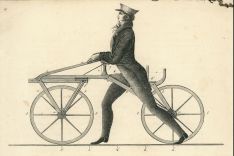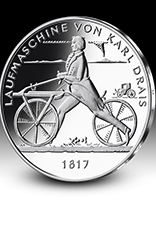Inhalt
200 years ago
Patent for Drais' “Laufmaschine”, the ancestor of all bicycle
The history of the bicycle began 200 years ago: on January 12,1818, Karl Freiherr von Drais received a ten-year Grand Ducal privilege for his “Laufmaschine” (running machine or balance bike, sometimes called ‘hobby horse’ in English) from the Baden duke, which today would be equivalent to a patent. Drais' running machine, in German also known as “Draisine” in honour of the inventor, was the first steerable, muscular-powered two-wheeler and thus the direct precursor of today's bicycle.
Six months earlier, on 12 June 1817, Drais (a forester by profession) presented his invention to the public. He drove the almost 15-kilometre stretch from Mannheim to Schwetzingen and back in just one hour. That was faster than the stagecoach and therefore a sensation. A well-preserved Draisine can be viewed today in the immediate vicinity of the DPMA at the ![]() Deutsches Museum in Munich.
Deutsches Museum in Munich.
Intellectual property rights were difficult to enforce at that time

Design drawing of the "Draisine"
Thanks to the Grand Ducal Privilege, every Laufmaschine in Baden had to have a license mark on the handlebar. Drais also received a "Brevet" in France. But despite the "Privilege", Drais had to experience how his invention was copied and sold without permission. Others applied for a patent for his invention in the United States or Great Britain, for example. At that time, intellectual property rights protection was still in its infancy and mostly ended at national borders.
With a weight of about 50 pounds, the ashwood Draisine was not much heavier than modern steel frame bicycle. It already had folding stands, a carrier and a brake. Especially the latter was sometimes lacking in plagiarism, which led to accidents or prohibitions and damage to the reputation of the invention.
Drais had possibly been inspired by the "Year without Summer" in 1816 to invent a means of locomotion without horses: the eruption of the volcano Tambora in Southeast Asia in 1815 caused a temporary deterioration of the climate in the northern hemisphere with rain and cold; failed harvests and lack of oats followed, which also made it difficult to feed the draught animals. A volcano can therefore be seen in the background on the German 20-euro special coin minted in honor of Drais in 2017, although this connection has not been proven. As early as 1813, Drais had unsuccessfully applied for a patent on a crank-operated "carriage without horses".
The most common vehicle in the world

20-euro jubilee coin commemorating the 200th anniversary of Drais´ invention
Drais, who was appointed Professor of Mechanics in 1818, was an innovative mathematician and a versatile inventor: among other things, he developed a music typewriter that wrote down notes while playing the piano, a rapid typewriter, a wooden stove and a cooking machine. Nevertheless, towards the end of his life, Drais was regarded as a failed "crazy inventor" rather than a technical innovator. It was only until long after his death that the recognition of his pioneering achievements began.
In the decades following the Drais’ patent, a number of decisive technical developments such as the rear wheel foot pedal drive, the air-filled tyre or the low-wheel frame design ensured that the bicycle received its current shape.
Today, with billions of bicycle sold worldwide, it is by far the most common vehicle: in Germany alone, there are about 72 million “Drahtesel” ("steel donkeys"). By the way, balance bikes are still very popular today - with small children.
In the DPMA patent database DEPATISnet you can search for all German patent specifications and documents of the most important patent offices and organisations worldwide on the subject of bicycles. In the IPC area B62M1 "Driving wheel vehicles by the driver", for example, there are more than 12,000 registered patent specifications.
Picture: Technoseum Mannheim, BADV / Hans-Jürgen Fuchs
Stand: 08.10.2024

Soziale Medien